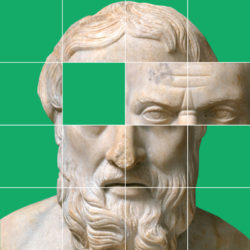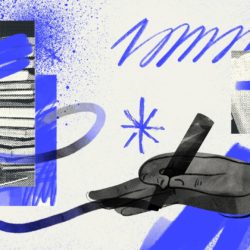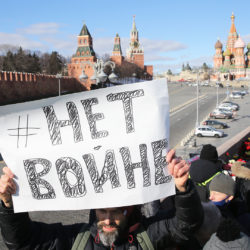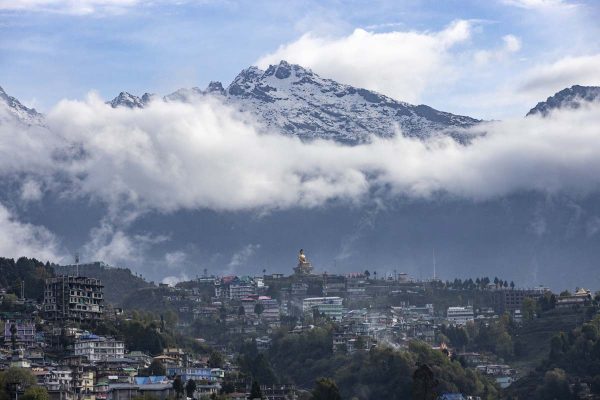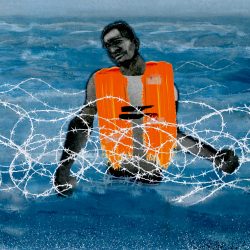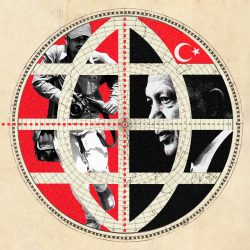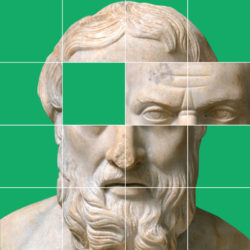
Sipa USA via AP
The Kremlin revises a textbook to dictate future understanding of Russian history
Russian high schoolers are heading back to school this fall with a new history textbook, revised by the Kremlin, that tells a story about Nazis running amok in Ukraine and the necessity of invading the country.
It’s the kind of direct political interference in education not seen in Russia since it was part of the Soviet Union. For nearly 30 years, teachers have been able to choose from a selection of approved textbooks to use in their classrooms. This year, Russian authorities have issued a single Russian history textbook nationwide for the 11th grade, and they plan to do the same across lower grades next year.
The revised textbook emphasizes continuity between the fight against Nazism in World War II and Russia’s aggression in Ukraine. The textbook quotes Vladimir Putin speaking about the “revival of Nazism” in Ukraine, and arguing that the country should not exist.
With an estimated number of Russian casualties exceeding 50,000, the Kremlin has continued to characterize the ongoing war as existential for Russia. The high school lesson plans — authored by Kremlin insiders — provide a window into the Kremlin’s thinking on the war and suggest that the Kremlin believes its own propaganda.
“On one hand history is being used as propaganda,” said Alexey Makarov, a member of the human rights organization Memorial in Moscow. “On the other, the people using history as propaganda — the Russian authorities — actually believe in what they’re saying.”
The newest chapters for students in the 11th grade, which is the final year of high school in Russia, include a section dedicated to the “special operation” in Ukraine. Ukraine is referred to as a “ultranationalist state,” the U.S. is said to be “prepared to fight until the last Ukrainian standing,” and a positive spin is put on global sanctions against Russia, calling them an “opportunity” for investment. The book’s front cover is dominated by a full-page photo of the bridge built by Russia in 2018 connecting annexed Crimea to mainland Russia.
“Ukraine, history, politics — they are inseparable,” said Jade McGlynn, the author of “Memory Makers: The Politics of the Past in Russia.” “It’s a memory war becoming a real war.”
The lead author of the textbooks is Vladimir Medinsky, a former culture minister who has represented Moscow in negotiations with Kyiv. Over the years, Medinsky has held various roles in government and served as a close aide to Putin, advising on history and the humanities. His career started in advertising, said McGlynn. During the 1990s, he co-founded a Moscow advertising firm best known for creating ads for MMM, a Russian company that ran one of the world’s largest-ever Ponzi schemes.
“That’s where he honed his skills in terms of selling narratives to people, playing on their hopes, their needs and sometimes their desperation,” said McGlynn. “He is ultimately an advertiser who aims to manipulate people.”
In the days following Russia’s full-scale invasion of Ukraine in February 2022, authorities already began distributing pamphlets to high school teachers across the country with instructions on how to talk about the invasion of Ukraine with students. The pamphlets followed a question-and-answer format:
Q: Why is the war happening?
A: NATO enlargement and its approach to Russia’s borders is a threat to all of us. There are the sad cases of Iraq, Libya and Syria. What’s more, Ukraine could create nuclear weapons. Considering the current regime in that country, it’s a direct threat to Russia.
Alexey Makarov, from Memorial, is a social studies teacher in Moscow and said he was devastated to read through the pages of the new textbook, soon to be taught at his high school.
“This is the same rhetoric that was used in the 1930s ahead of the invasion of Poland, exactly the same,” said Makarov, drawing a comparison between the textbook’s justification for Russian forces occupying Ukraine and the Soviet Union’s stated rationale for invading Poland at the start of World War II.
There has been a progression in the government’s campaign to rewrite history, starting with the reframing of Russian imperial expansion and the rehabilitation of figures like Ivan the Terrible. While history has long been an important focus for Putin, patriotic education became a top government priority in 2012, which the government declared to be the “year of history.”
“We know how the distortion of national, historical and moral consciousness leads to catastrophe for entire governments. It weakens them, leading to collapse, to the loss of sovereignty and fratricidal war,” Putin said in a meeting in 2012 on the importance of patriotic education in Russian schools.
In the lead up to the invasion of Ukraine, the Kremlin tightened its grip on institutions involved in documenting the country’s past. As Russian troops marched on Kyiv, the Russian Supreme Court struck down an appeal from Memorial to stay open. For three decades the nonprofit, a co-recipient of the Nobel Peace Prize, has been documenting crimes committed under Soviet rule.
Russia is far from the only country where the government has intervened to revise high school history textbooks. The Arab Spring has been distorted in Egyptian textbooks, Indian officials have excised mentions of the 2002 Gujarat riots from national textbooks, and new curriculum standards in Hungary assign the writing of a war criminal and Nazi sympathizer to students. Most recently, officials in the U.S. state of Florida approved classroom material that instructs students that “climate activists are like Nazis.”
The new Russian history textbooks will most likely cross the border into occupied Ukrainian territory. Last August, reports surfaced of Ukrainian teachers being pressured to switch over to a Russia-approved curriculum. Scores of teachers fled, some went into hiding, and others were sent to Crimea or Russia to “re-train” under new teaching standards. In occupied cities like Melitopol, Russian authorities ceremoniously delivered tens of thousands of Russian textbooks. Parents who tried to keep their children at home were threatened with having their kids taken away.
The story you just read is a small piece of a complex and an ever-changing storyline that Coda covers relentlessly and with singular focus. But we can’t do it without your help. Show your support for journalism that stays on the story by becoming a member today. Coda Story is a 501(c)3 U.S. non-profit. Your contribution to Coda Story is tax deductible.



